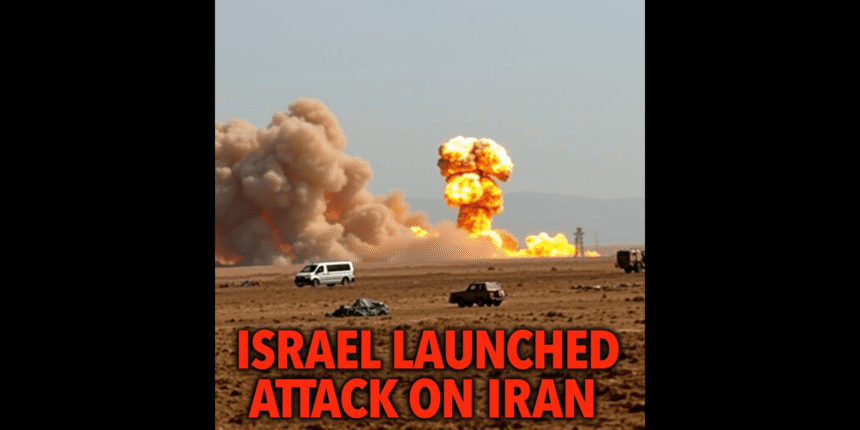More than 100 Iranian targets, including nuclear facilities, were struck by Israeli missiles.
Tensions in the Middle East have sharply risen as Israel launched military strikes against Iran’s key military leaders and nuclear sites. These actions mark a significant escalation in a long-standing conflict that could reshape regional power balances. Countries around the world now watch closely, fearing that retaliation from Iran or its allies could ignite a larger war. The ripple effects could threaten peace, disrupt energy markets, and strain diplomatic ties for years to come.
Israel’s Recent Military Actions Against Iran
Background of the Operations
In recent weeks, Israel conducted visible strikes on Iran’s military commanders and nuclear development sites. These attacks didn’t happen by chance—they come after months of intelligence gathering and covert operations. Israel has long aimed to stop Iran from building nuclear weapons, eager to prevent a regional arms race. Past efforts were limited, but today’s strikes mark a bold step into more direct action.
The timing was critical. Israel claims Iran was advancing its nuclear program in ways that threaten its security. These recent operations are part of a broader pattern of covert sabotage and targeted killings aimed at Iran’s leadership and nuclear infrastructure.
Targets and Objectives
Several military figures were the focus of the latest strikes, specifically Iranian Revolutionary Guard commanders linked to missile and drone development. Satellite images confirmed sensitive activity at nuclear facilities, especially Natanz and Fordow, where uranium enrichment occurs.
The main goal? Disrupt Iran’s progress toward nuclear weapons and send a clear warning. By targeting military leaders, Israel hopes to weaken Iran’s military capacity. Destroying nuclear sites may slow Iran down, but it also risks worsening their resolve to retaliate.
Tehran said the Israeli raids were a “declaration of war” after they struck over 100 key Iranian targets, including nuclear and missile complexes, and killed top military leaders and scientists.

International Response and Reactions
The world’s major powers split over Israel’s actions. The U.S. called for calm but tacitly supported Israel’s right to defend itself. European nations varied in their responses—some condemned the strikes, others warned against escalating conflicts. Middle Eastern countries reacted with cautious concern, worried about spiraling violence.
The UN Security Council held meetings but failed to issue a firm statement. Diplomats now worry that these actions could close off diplomatic channels, making future negotiations even harder. Tensions have skyrocketed, putting regional stability at risk.
Iran’s Response and Escalation Strategies
Military and Cyber Countermeasures
Iran responded swiftly. It warned of revenge and increased military readiness. Iranian-backed militias in Iraq and Lebanon have issued threats and some have launched missile or drone attacks near Israeli or U.S. interests. Iran also ramped up cyberattacks, targeting Israeli infrastructure and regional allies to sow chaos.
This asymmetric warfare makes Iran’s response difficult to contain. They use proxies and cyber tactics to hit where it hurts, often avoiding direct clashes but causing significant damage.
Diplomatic and Propaganda Campaigns
Iran is trying to rally soft support through diplomatic channels. It’s accusing Israel of aggression and calling for international solidarity. Its media campaign paints Israel’s strikes as unjustified, rallying regional opinion against it. Iran hopes to create a united front that isolates Israel and pressures Western countries to reconsider their support.
Potential for Regional Reprisals
The threat of escalation isn’t limited to Iran alone. Iran’s allies, especially Hezbollah in Lebanon, could launch missile attacks on northern Israel. Syria may also become a battleground if hostilities ignite. Border clashes could spiral into wider confrontations, creating a volatile environment.
The Broader Impact on Middle East Stability
Regional Geopolitical Shifts
Israel’s bold moves could reshape alliances. The U.S. might increase support for Israel, while Iran seeks help from Russia and China. These shifts could strengthen Iran’s ties with its regional allies but also deepen divisions. Ongoing conflicts, like in Syria and Yemen, could see new flare-ups, complicating peace efforts.
Global Energy Markets and Economy
Oil prices already surged amid fears of supply disruptions. If tensions grow worse, the Middle East’s oil exports could face interruptions, pushing fuel prices higher worldwide. Investors and businesses feel the strain, worrying about losing access to vital energy supplies.
The Prospect of a Broader War
Experts warn that escalation could slip into a wider conflict. Past regional wars warn us how quickly things can spiral out of control. If diplomacy fails, the Middle East might face a protracted, devastating war. International actors must act quickly to prevent this from happening.
Expert Insights and Future Outlook
Strategic Analysis from Security Experts
Analysts see Israel’s strikes as a calculated move to stall Iran’s nuclear ambitions. However, Iran’s military capabilities are formidable, and retaliation could intensify. Some experts believe both sides are prepared for a prolonged confrontation if diplomacy doesn’t resurface soon.
Diplomatic Pathways
Despite rising tensions, negotiations remain possible. Backdoor talks and international mediators can help ease the crisis. The goal must be de-escalation, especially through diplomatic channels rather than military force.
Actionable Tips for Stakeholders
Governments in the region should consider strengthening security and intelligence. Businesses should prepare for volatile markets by diversifying supply chains and energy sources. Policymakers need to prioritize dialogue, aiming to cool tensions and prevent a wider war.
Conclusion
Recent Israeli strikes on Iran’s military leaders and nuclear facilities mark a turning point in Middle Eastern conflicts. These actions could trigger powerful retaliations and destabilize the already fragile region. As the world watches nervously, efforts toward diplomacy and de-escalation are more urgent than ever. Without peace talks and restraint, the risk of a wider war looms large. It’s now up to leaders everywhere to choose paths that lead away from chaos. The future of Middle East stability depends on the choices made in the coming days.

